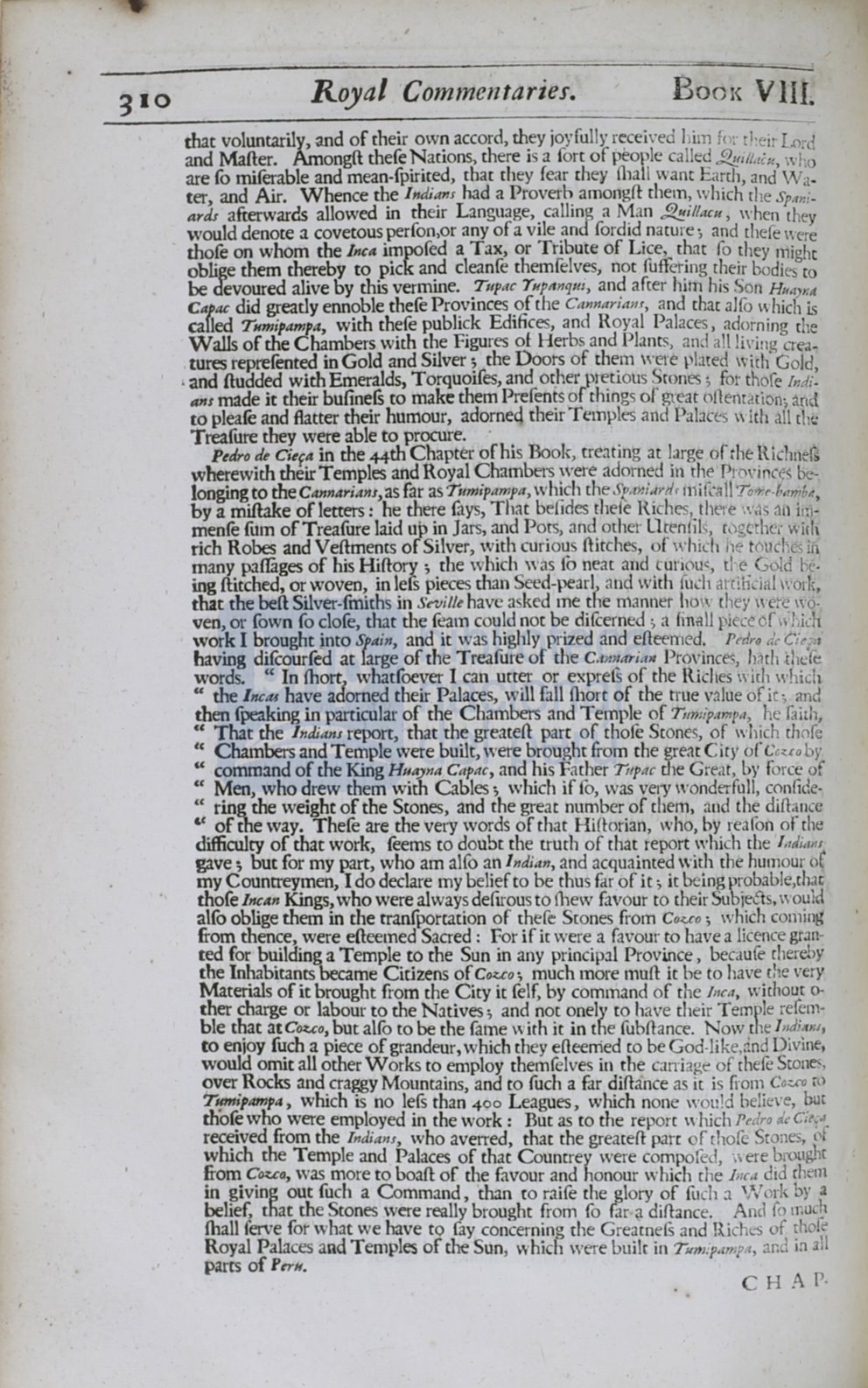

Royal Commentaries.
B oo K
VIII.
that
voluntarily, and of their
ow~
accord> th_ey joyfully
r~cei\·ed
hi
n
f< ··
~e 1
1
.o·d
and Mafter. Amongfi thefe Nauons, there
i
a fort of peo
le called
~11/,!cu, .
}
1
are
fo
miferable and mean-fpirited,
that they
fear rhey (hail wam
Earth, and\
'a·
ter, and
Air.
Whence the
Indians
had a Proverb amongfi them,\ hich
the
Spnm·–
ard.J
afterwards
allowed
in
their Language> calling
a
Man
~il!acu,
\\' hen
they
would denote a covetous perfon,or any ofa vile and fordid
nature; and thefe were
- thofe
on
whom
the
Inca
i!llpofed
a Tax,
or Tribute
of
Lice
t~a t
fo
~hey
might
oblige them thereby to pick and cleanfe rhemfelves, not fuffermg their
bodies
to
he
devoured alive
by this
vermine.
Tupac Tupanqui,
and after him hi Son
Huaynd
Ca1_ac
did
greatly
enn?ble thefe
Pr~vinces
?f
the
Cannarianr,
and
tbar alfo which
is
called
THmipampa,
with thefe
pubh~k
Edifices, and
Royal Palaces , adorning
t
1
e
Walls of the Chambers
with
che
Figures of
Herb
and
Plants> and al
li\
1
ing
crea–
tures
reprefented
in
Gold
and
Silver? the Doors of
th~m
were
plated
wirh
Gold,
.. and
ftu(fded
with
Emeralds,
T
orquoifes,
and
other
preuous
tones ; for thofe
Indi–
ans
made
it
their bufinefS to make them Prefents of things of grea t
of1emation;
an
to pleafe and flatter their
humour, adorned
their Temples and Pab es
v\
ith
all
cl
(t
'treafure they were able to procure.
·
Pedro de
Ciera
in
the
+1-th
Chapter of
his
Book) treating
at large of theRi
nefi
wherewith
their
Temples
and
Royal
Chambers
were adorned in
the Pr
inc<;
be~
longing to the
Cannarian1,
as far as
Tumipampa,
which the
i:ani~,,.d
r
min all
To~e-bamba,
by
a
nililake of letters : he there
fays,
That
befides
rhef
e
R1
hes,
there . · an
im–
menfe
fwn
ofTreafure laid
up
in
Jars,
and
Pots,
and other
U tenGL,
ng
l
er
wirh
rich
Robes and Vefiments ofSilver,
with
curiou fl:itche ,
f '
·fl ich
1e
tot
ches in
many paffitges of his Hiftory ; the which was fo neat and urious, tl"'e
old
be.
iog filtched, or woven,
in
lefs pieces than eed-pearl and
v\
ith
fo
-h
anio
ml work
thit
the
heft
Silver-fmiths in
Sroille
have a ked me
the
manner
h
w
they
wee
n-o–
ven, or fawn
fo
clofe, that the feam could
not
be difcerned ; a finall
iece
of\
'hici
work I brought into
Spain,
and it was highly prized and efieemed.
Pedro
de
Cie
~
having difcourfed
at large
of the Treafure of the
c~nnarian
Pto ince ,
had
tt1e1e
words.
''
In
lhort whatfoever I can utter or
expre~
of the Riches
wid1
which
" the
lnctU
have
adorned
their
Palaces,
will
fall
!hort of the true
value of
ir; and
then
f
peaking
in
particular of the
Chambers
and
T
ernple of
'111mipampa,
he
faith,
" That the
Indians
report, that the greatefl: part of thofe Scones,
of
which
rhnfe
~'
Chambers and Temple were built, were brought from the great
C ity
of
Ccz.coby
" command of the King
Huayna Capac,
and his Father
'Tttpac
the Great,
by
f< rceof
" Men,
who
drew
them
with Cables; which if fo,
was
very
wonderful}}
confide–
" ring
the weight of the Stones, and the great n
umber of
chem,
and the difiance
~'
of the way. Thefe are the very
words of
that
H.iO:orian, who,
by
reafon of the
difficulty
of that work, feems
to
doubt the truth of
that
report which the
L1dia111
gave; but for
my
part, who am alfo an
Indian,
and acquainted with the humour
t
my
Councreymen,
I do declare
my
belief
to be thus far
of
it ;
it
being
probable,chac
thofe
lncan
Kings, who
were
always deGrousto !hew
favour
to
their SubjeCls, \ ould
alfo oblige them
in
the tranfporcation
of
the[e Stones from
Couo ;
\
hich
corning
fi-om thence, were
efieemed Sacred :
For
if
it were a favour to have a licence grJn–
ted for building a Temple co the Sun
in
any principal Province, becaufe thereby
the Inhabitants
became
Citizens of
Co:uo;
much more
muft
it
be to have
tie
very
Materials of
it
brought from the City it felf, by command of the
Jnca,
without
o–
ther charge
or
labour to the Natives;
and
not onely to have their Temple
refem..
hie
that
at
C~o,
but alfo to be the fame
with
it in the
Cubfiance.
Now
the
l mliam,
to enjoy fuch a piece of grandeur,which they eileenied
to
be God-like,and
Divine,
would omit all
other
Works to employ themfelves in the can-ia e of thefe
Stan~
over
Rocks and craggyMountains,
and to fuch
a far
diflance
as
it
is
from
Co~
r
1
T1f111i/""!Pa
~
which
is
no 1efs than
4 0 0
Leagues, which none would be ie
Te,
buc
chofe wlio
were
employed in the work : Bue as
co
the report which
Pedro d
Cieq.1
received
from
the
Indians,
who averred, that the greacefi parr
f
thofc
rone ,
whic
h theTemple and Palaces of that Countrey were compare , -, ere
brought
from
Co.ua,was more to boaft of the favour and honour
w
hkh the
1"ca
did
rhem
in
gi
ving out fuch a Command, than to raife the glory of
fu
h a
~
·v
or b)
a
belief, that the Stones were really brought from
fo
far
a
difl:ance.
And
fo
mu
h
fuall
ferve
for
hat we have
to
fay
concerning the Greatnef
and
Ric es of
t
o[e
Royal
Palaces and
Temples
of the
Sun, which
were
built
in
Tum:pjlm a,
n ·n
l~
parts of
Pn-11.
H.
p.














